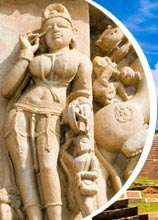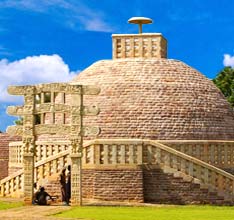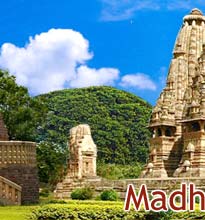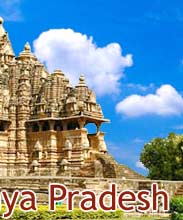 The
city of Gwalior, situated in the state of Madhya Pradesh, is well-known
for its rich variety of ancient monuments. Located 26.22o
North and 78.18oEast, at an average elevation of 197 m (646
ft), the Indian city boasts of staggering edifices and esteemed
educational institutions. According to legends and folklore, Gwalior
derived its name from a hermit-saint called 'Gwalipa', who was believed
to have cured a leprotic chieftain of the 'Kachwaha' clan, during the
8th century A.D. The chief later built the city to honor and show his
gratitude to the sage.
The
city of Gwalior, situated in the state of Madhya Pradesh, is well-known
for its rich variety of ancient monuments. Located 26.22o
North and 78.18oEast, at an average elevation of 197 m (646
ft), the Indian city boasts of staggering edifices and esteemed
educational institutions. According to legends and folklore, Gwalior
derived its name from a hermit-saint called 'Gwalipa', who was believed
to have cured a leprotic chieftain of the 'Kachwaha' clan, during the
8th century A.D. The chief later built the city to honor and show his
gratitude to the sage.Gwalior was also a rocking cradle that saw the naissance and the culmination of many dynasties. Its architectural specimens underline its governance by different rulers and art aficionados. Tastefully done palace architecture and unscalable forts adorn the place. From delicate Mughal ornamentations to intricate patterns borrowed from Tuscan, Corinthian and Italian architectural styles, the city houses monuments that still throb with a bygone charm. Gwalior, at its present state, is divided into three larger alcoves - Lashkar, Morar and Gwalior.
Apart from its forts and buttresses, the city is renowned for its fine confluence of art and music. It is home to many famous music maestros and geniuses. Gwalior is the birthplace of the legendary musician 'Tansen', one of the nine jewels of Akbar's court. To commemorate his memories, every year a national level music festival, called the 'Tansen Music Festival', is organized here during the month of November/ December. The place enlivens with a musical spirit and sees talent from all the corners of India.
Today, Gwalior stands out in the Indian map, for its fine blend of historical singularity and its subtle modern trimmings. From devotees, archaeologists and business tourists to art connoisseurs and gourmands, Gwalior has something for everyone. Many quaint markets are scattered throughout its heart, well-known for their antique and rare curios. Its close proximity to tourist destinations like Delhi, Agra and Khajuraho also bolsters its tourism industry manifold. For anyone who plans a trip to Madhya Pradesh, the historic city of Gwalior is surely worth a visit.









